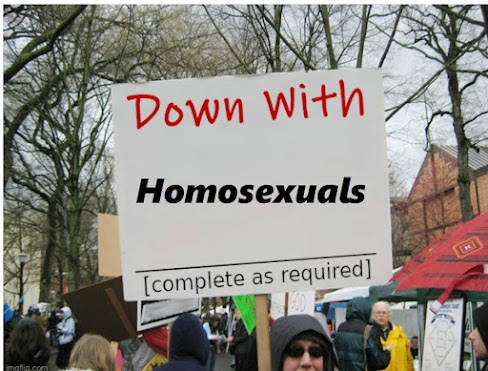Down With... Homosexuals
As most of you will probably know by now, our current film series is looking at a phenomenon currently termed Cancel Culture.
Current examples of Cancel Culture are legion, and one has only to glance at the news on any given day to see yet another example of some individual or other whose life has been torn apart because they said the wrong thing, or "liked" the wrong Tweet, or praised the wrong film.
As of this writing, a story has been running in the UK news about an Essex pub that was raided by the police because it had "Golly" dolls on display.
Last week, the full force of the internet came crashing down on the Dalai Lama because he allegedly asked a young boy to "suck his tongue."
When a new Harry Potter video game was released in February, fans were urged to boycott the release in order to protest author J.K. Rowling's views on transgender issues.
Some of these cases may strike you as trivial. Some of them might be genuinely shocking. Some of them might be complex and morally ambiguous issues that need to discussed rationally, and which cannot (and should not) be settled in Twitter posts.
This, to my mind, is the biggest problem with modern Cancel Culture: no matter how sincere the issue, and no matter how genuine the controversy, the debate always seems to devolve into performance outrage for a social media universe that rewards shock value, and drives everything to the extremes.
Many of the issues touched upon by films I have selected thus far are issues that are not currently considered controversial.
We can look back at the Salem Witch Trials and be horrified by what was done in the name of "protecting society."
We can look at the segregationists portrayed in The Intruder and comfortably say that they were on the wrong side of history.
We can be outraged by Nazis, and by the anti-Communist hysteria of the 1950s, and we can point and laugh at Ayn Rand because she was, well, bat-shit crazy.
The point is, however, that each one of these issues was a hot-button, incendiary topic of its time. To live through any one of these periods (and to take sides in the debate) was to fight a battle to protect the integrity of your world. The consequences of letting them get their way were too awful to contemplate, so of course they needed to be stopped at any cost.
That's why it's called a Culture War.
As we move into the second half of our film series, I want to look at some issues that may be a little closer to home; a little closer to the front line of that war.
Victim was released in 1961 and stars Dirk Bogarde as a successful London Barrister who must make some very difficult decisions when outside events threaten to expose aspects of his private life.
(Rightly) considered a masterpiece and a classic of British cinema, Victim was released just a few years after the publication of the so-called "Wolfenden Report," which had formally recommended decriminalising homosexuality in Britain.
At that time, homosexual acts between men were illegal, and anyone caught by the police was forced to run a gauntlet of press photographers at the courthouse when they were brought up on charges. Because public exposure could effectively destroy someone's life, gay men were especially vulnerable to blackmail (criminalising homosexuality was often known as the "blackmailer's charter") and it often seemed as though the blackmailers were the main beneficiaries of the law.
Victim was an important film, not only because it dealt with the issue in a calm, non-sensational way, but also because it helped to turn the tide of public opinion in this country. The UK Government had not acted upon the recommendations of the Wolfenden Report, and homosexuality was not decriminalised until 1967 (in England and Wales. Scotland and Ireland did not follow suit until the 1980s).
Dirk Bogarde gives the performance of his life in a role that had originally been written with an older actor in mind. James Mason had reportedly been keen to play the part, but unfortunately was stuck in Hollywood at the time. For Bogarde, who never went public about his own sexuality (but was almost certainly gay) playing this role was a risk at a time when homosexual behaviour meant criminal charges and possible prison time.
To modern eyes, Victim is a well-written, tightly plotted British drama, but in 1961 it was a shocking and hard-hitting exposé of one of the hot-button issues of the moment.
We will be screening Victim at 7.30pm (downstairs, in Screen Two!) on Thursday, the 20th of April at the Victoria Park Baptist Church.

















Comments
Post a Comment